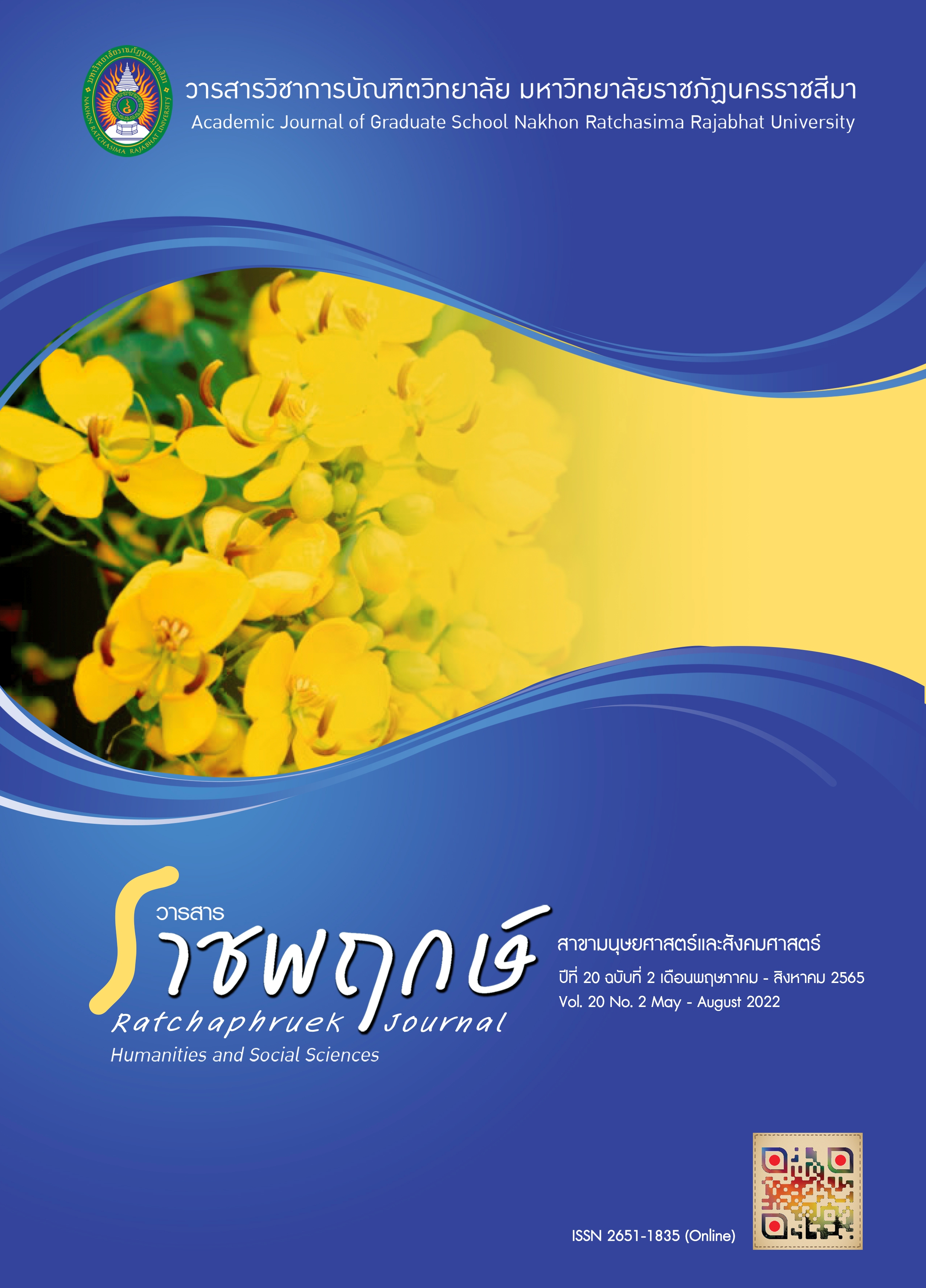A Study of the Curriculum and Learning Management Competency through PBL of the Students in Bachelor of Education Program
Main Article Content
Abstract
This research was to study the curriculum and learning management competency by using problem based learning for the pre-service teachers. The objectives were: 1) To compare the competency between the pre-test and post-test score; and 2) To compare the competency between post-test score and 70% of standard criterion. The sample consisted of 32 second-year pre-service teachers majoring in General Science, Faculty of Education, Nakhon Ratchasima Rajabhat University, in the first semester, 2021 academic year. They were selected by using the simple random sampling method. The research tools were the lesson plan and competency test. The collective data were analyzed by means, standard deviation, percentage, t-test for dependent, and t-test for one sample. The results showed that: the post-test’s mean score were significantly higher than pre-test’s mean score at .05, and the post-test’s mean score was lower than the 70% of standard criterion.
Article Details

This work is licensed under a Creative Commons Attribution-NonCommercial-NoDerivatives 4.0 International License.
References
นิ่มนวล แก้วพิลา.(2561). การพัฒนาการเรียนการสอนโดยใช้รูปแบบปัญหาเป็นฐานเพื่อพัฒนาผลสัมฤทธิ์ทางการเรียนของนักศึกษา ระดับปริญญาตรี สถาบันการพลศึกษา วิทยาเขตอุดรธานี. วารสารการวัดผลการศึกษา, 24(1), น. 167-178.
พรรณอร อุชุภาพ. (2561). การศึกษาและวิชาชีพครู. กรุงเทพฯ: สำนักพิมพ์แห่งจุฬาลงกรณ์มหาวิทยาลัย.
พาสนา จุลรัตน์. (2561). การจัดการเรียนรู้สำหรับผู้เรียนในยุค Thailand 4.0. Veridian E-Journal, Silpakorn University, 11(2), น. 2367-2368.
ไพฑูรย์ สินลารัตน์. (2560). ความเป็นครูและการพัฒนาครูมืออาชีพ. กรุงเทพฯ: สำนักพิมพ์แห่งจุฬาลงกรณ์มหาวิทยาลัย.
เลิศนภา พงษ์ดำ. (2560). การพัฒนาสมรรถนะในการปฏิบัติงานด้านการจัดการเรียนการสอนของข้าราชการครู: กรณีศึกษาโรงเรียนสุเหร่าดอนสะแก (รายงานการศึกษาค้นคว้าอิสระ, มหาวิทยาลัยรามคำแหง). สืบค้นเมื่อ 5 มกราคม 2565, จาก http://www3.ru.ac.th/
mpaabstract/files/2560_1561117799_6014830002.pdf
วิจารณ์ พานิช. (2555). วิถีสร้างการเรียนรู้เพื่อศิษย์ ในศตวรรษที่ 21. กรุงเทพฯ: มูลนิธิสดศรี-สฤษดิ์วงศ์.
วิโรจน์ สารรัตนะ. (2556). กระบวนทัศน์ใหม่ทางการศึกษา: กรณีทัศนะต่อการศึกษาศตวรรษที่ 21. กรุงเทพฯ: ทิพยวิสุทธิ์.
วุฒิชัย วรครบุรี, พระครูสุธีจริยวัฒน์ และไพศาล สุวรรณน้อย. (2561). โปรแกรมพัฒนาการเรียนรู้ที่ยึดปัญหาเป็นฐานสำหรับห้องเรียนศตวรรษที่ 21 สำหรับโรงเรียนขยายโอกาสทางการศึกษา สังกัดสำนักงานคณะกรรมการการศึกษาขั้นพื้นฐาน. วารสารศึกษาศาสตร์ มหาวิทยาลัยมหาสารคาม, 12(2), น. 258-269.
สำนักงานคณะกรรมการการศึกษาขั้นพื้นฐาน. (2553). คู่มือการประเมินสมรรถนะครู สำนักงานคณะกรรมการการศึกษาขั้นพื้นฐาน พ.ศ. 2553. สืบค้นเมื่อ 5 มกราคม 2564, จาก http://www.tmk.ac.th/teacher/capasity.pdf
สำนักงานเลขาธิการสภาการศึกษา.(2563).การจัดการเรียนรู้ฐานสมรรถนะเชิงรุก. สืบค้นเมื่อ 1 กุมภาพันธ์ 2565, จาก http://backoffice.onec.go.th/uploads/Book/1801-file.pdf
Campos, D. M. (2017). Problem-Based Learning: An Experiential Strategy for English Language Teacher Education in Chile. Issues in Teachers’ Professional Development, 19(1), pp. 29-40.
Gardner, J. W. (2002). Cooperative learning series: Problem-based learning. Retrieved January 19, 2022, from http://www.studygs.net/pbl.htm
Merritt, J., Lee, M., Rillero, P. & Kinach, B. M. (2017). Problem-Based Learning in K-18 Mathematics and Science Education: A Literature Review. Interdisciplinary Journal of Problem-Based Learning, 11(2), pp. 1-11.
Patilima, S., Rahmat, A., Zubaidi, M. & Husain, R. (2020). Teacher Professional Competence in Applying the Problem Model Based Learning Class IV Integrated Thematic Learning SDN 2 TOMBULANG.International Journal of Innovations in Engineering Research and Technology, 7(12), pp. 133-140.
Sikhakhane, M., Govender, S. & Maphalala, M. C. (2020). Investigating Pedagogical Paradigm Shift in the 21st Century Teaching and Learning in South African Secondary Schools. International Journal of Education and Practice, 8(4), p.707.
Sistermans, I. J.(2020). Integrating Competency-Based Education with a Case-Based or Problem-Based Learning Approach in Online Health Science. Asia Pacific Education Review, 21(4), pp. 683-696.
Ulger, K. (2018). The Effect of Problem-Based Learning on the Creative Thinking and Critical Thinking Disposition of Students in Visual Arts Education.Interdisciplinary Journal of Problem-Based Learning, 12(1), pp. 1-19.
Yew, E. H. J. & Goh, K. (2016). Problem-Based Learning: An Overview of its Process and Impact on Learning. ScienceDirect, 2(2), pp. 1-5.


